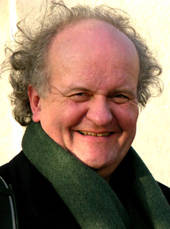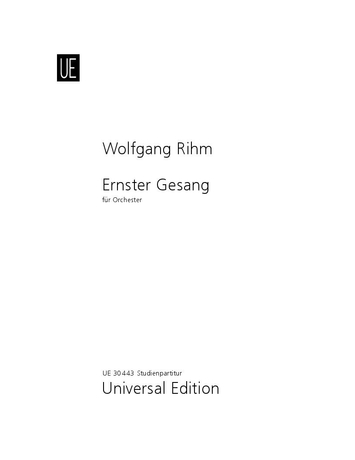

Wolfgang Rihm
Ernster Gesang
Short instrumentation: 0 1 4 3 - 4 0 3 1 - timp, vla(12), vc(10), cb(8)
Duration: 13'
Dedication: dem Andenken meines Vaters
Instrumentation details:
cor anglais
1st clarinet in A
2nd clarinet in A
3rd clarinet in A
4th clarinet in A
1st bassoon
2nd bassoon
contrabassoon
1st horn in F
2nd horn in F
3rd horn in F
4th horn in F
1st trombone
2nd trombone
3rd trombone
bass tuba
timpani
viola (12)
violoncello (10)
contrabass (8)
Rihm - Ernster Gesang for orchestra
Sample pages
Audio preview
Work introduction
When Wolfgang Sawallisch invited me to compose an orchestral piece for him and the Philadelphia Orchestra, a piece that should in a specific way establish a connection to Brahms, it was immediately clear to me that this piece could not become a display of "fireworks" but rather raise its melodies from recumbent and cloudy voices. The primary tonal colour of clarinets, horns, and low strings was the first compositional decision. For months I sang and played through lieder of Brahms and piano pieces from his late period, became entangled in harmonic constellations, the pointed and at the same time murky sweetness of which I could not get out of my mind —for example, the plethora of stacked thirds from which he created bittersweet suspensions. More and more, I was also captured by the discreet nature in which Brahms proceeded. The mystery of the Vier ernste Gesänge only revealed itself to me in those days of unceasing contact to his world.
A different level of reflection entered into my work: because of my dealings with so-called fatherly compositional material and through the expressive world of the Ernste Gesänge, my thoughts began to circulate around my own father, who had died a short time before and whom I began to understand in a new fashion as a result of this one-sided dialogue. Becoming a father myself may for the first time have developed my capability to understand myself as a son. The artistic origins, when viewed from the outside, seem to be more easily traceable because they have been committed to paper. But even they always owe their existence to the work of a son or a daughter: my material originates only then, when I apply it, but it was always present. It is a gift. I am but its medium.
Ernster Gesang, which owes its creation to the above reflections, can be heard as an intermezzo, a stopping, a listening; a reflexive moment of pause in my creative work which owes its stimulus to my father. I dedicate this piece of music to the memory of my father.
As I composed it during the last days of the year 1996 in Badenweiler, I was both filled with and empty of Brahms. The repercussions, the constellations that existed in my memory, disappeared when I wanted to grasp them or force them into a concrete form. Their appearance is thus always their immediate disappearance as well. What remains is an intonation, a turning of events that wavers between arrival and departure.
Wolfgang Rihm

